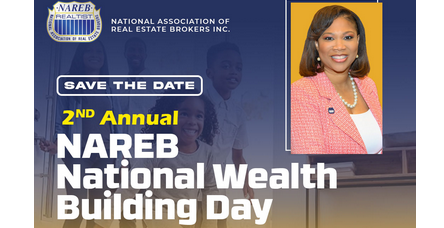Put simply, we spend more money as poor people trying to somehow live vicariously through the wealthy. Most of us do this and repetitiously dig ourselves into a financial pit without realizing that the people whose lifestyles we try so hard to emulate are investing and saving while we spend. Our gravest mistake is making large sums of money and then putting it right back into the hands of the very people that we would outrightly deem as our oppressor. Fashion, jewelry, automobiles, landlords, credit cards, and even fast food franchises are debt-inducing elements in most of our lives. Most of us complain about this “almighty� and powerful oppressor and yet, we keep it in power; of our own free will.
For many years the talk of reparations has been a serious buzz in many African American communities. Reparations, in this case, is compensation for the descendants of African slaves in America. Who gets it? How much do they get? Where does the money come from? These are but a few questions that may come to mind. But the most important question should be: will it serve it’s rightful purpose?
The fight for reparations has been long standing since this country’s Reconstruction Era. Some are pursuing big businesses who are now corporate giants because of the enslavement of Africans while many want the U.S. government to fork up the money. It seems visionary and even plausible that an oppressive government finally pays the oppressed their due, by way of ancestral ties. The sure reality is that if it does happen, it is a long time coming. So what do we do in the meantime? Be prepared.
Many of the socioeconomic ills that African Americans suffer from should be in question for those fighting for reparations. The so-called leadership in our communities should be strategizing a plan to combat these ills in juxtaposition with the fight for reparations. With all the ranting about our oppression and the demands for some monetary compensation there should be a thorough self examination within the African American community. Analytical prowess and critical thinking should vanguard our emotions. We would certainly love to see some form of a collective victory, but we have to self reflect first.
The African American community operates as one of the strongest elements of “buying power� in America. Put simply, we spend more money as poor people trying to somehow live vicariously through the wealthy. Most of us do this and repetitiously dig ourselves into a financial pit without realizing that the people whose lifestyles we try so hard to emulate are investing and saving while we spend. Our gravest mistake is making large sums of money and then putting it right back into the hands of the very people that we would outrightly deem as our oppressor. Fashion, jewelry, automobiles, landlords, credit cards, and even fast food franchises are debt provoking elements in most of our lives. Most of us complain about this “almighty� and powerful oppressor and yet, we keep it in power; of our own free will.
Our ancestors could only dream of manifesting the opportunities that we have available to us today. Our Civil Rights participants were abused and degraded to sit in the seats that take for granted every day. And yet, their struggles would appear to be of no avail. Because of our conditions, their hardships and struggles are considered in vain to many. So, what good is it to have a reparations check issued if it will be put right back into the hands of the issuer? What good is it if we do not make proud those who came before us?
The truth is that the African American community has suffered so much on both the economic and social levels, that it’s members scramble at any chance of feeling important. If you listen closely, you will hear it in the most mundane of situations; on the streets, at a party, in our music, and so forth.
Just about everything that we hear or see is about getting money and feeling or looking important. Rather, it should be about getting the money, starting some financial planning, saving, and becoming important and teaching people in your immediate communities how to become important in this country too. Sadly, that’s not what happens. Instead of “We,� it is “I.� It’s every man for himself. This frame of mind is a mortal disease that may ultimately lead to the demise and the Black and poor.
But the rich ones, they’ll be okay because the world becomes a different place when you are sitting on millions. Even some African Americans who have succeeded financially are still limited in their thinking when it comes to the economic empowerment of their people. Sure, they run Black businesses, sponsor foundations, and own clothing lines, but some of those things only add to the detriment. Poor Black people still chase those high-priced goods in hopes of feeling better about who or whatever they are. We fail to realize that these superficial constructs are not always implemented to cater to the power of “buying black� at a price that you can afford. It is “buy black� if you can afford to.
While fighting for reparations there should also be a fight for stricter education. There should be a fight for parenting programs, drug abuse, AIDS awareness, alcoholism, financial planning, and so forth. Fighting for these things first will build a higher morale, a stronger intellect, and implant a fundamental core of self preservation. These are crucial components to be considered in the struggle for reparations. Rather than fighting for individual compensation, a massive fund seems more instrumental for mutual progress. A massive fund used towards education, developmental and trade school programs, purchasing property, assistance with medical expenses, building homes, and improving the conditions of our current neighborhoods is the best reparations that can be given right now.
The intentions of this quest should be re-analyzed again and again. There should be a mutual concern about the empowerment of the African American community and no concern at all about just getting some “get back� from an accused oppressor.
With this ideology in mind, there is a potential victory, otherwise we may be setting ourselves up for some serious failure.
Those who are dedicating their lives to the Reparations Movement need to begin the fight by considering the fundamental problems in our communities and then move from there. You can’t flip burgers all your life and walk into a Five Star restaurant and convince the owner that you are a gourmet chef. Because if he hires you, and you fail, you will find yourself right back where you started- flipping burgers.
Readers send your comments to this column to [email protected]
*****
To subscribe to or advertise in The Black Star News, the world’s favorite Pan-African news weekly, please call (212) 481-7745. Contact us via [email protected] if you have any questions or news tips.











